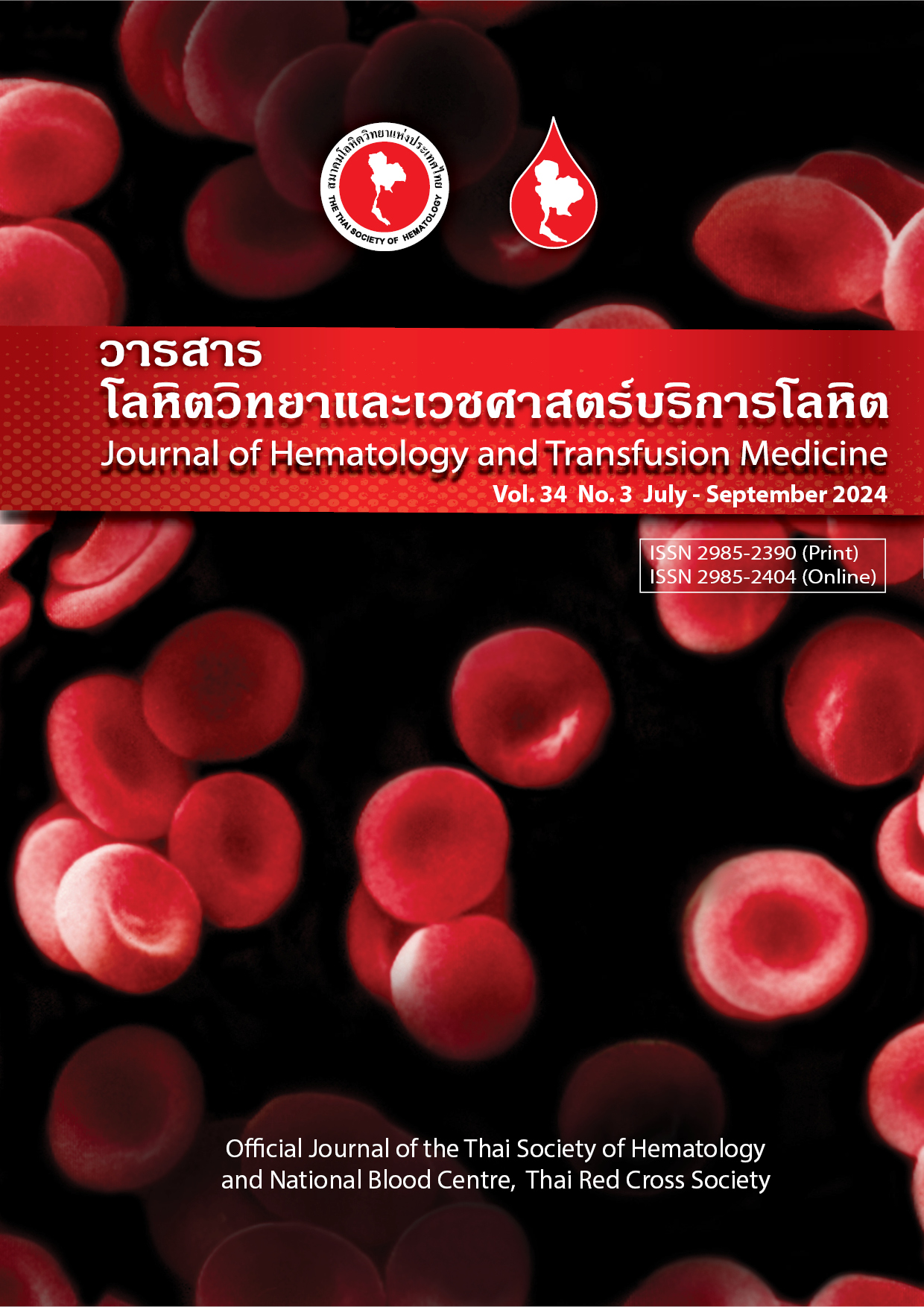Acetaminophen and Chlorpheniramine Maleate Premedication among Patients with Chronic Transfusion: a Prospective, Randomized Controlled Trial
DOI:
https://doi.org/10.69898/jhtm.v342024Keywords:
premedication, leucocyte poor packed red cell, transfusion reactionAbstract
Introduction: Patients with chronic transfusion, especially those with transfusion-dependent thalassemia, are
susceptible to transfusion reactions. Acetaminophen and/or chlorpheniramine maleate (CPM) are commonly
used as premedication in Thailand, although their efficacy in preventing transfusion reactions remains unclear.
This study aims to evaluate the efficacy of acetaminophen and CPM in preventing febrile nonhemolytic
transfusion reaction (FNHTR) and allergic transfusion reaction (ATR) before leukocyte-poor packed red cells
(LPRC) transfusion.
Methods: This study is a prospective, randomized controlled trial involving patients with chronic transfusion
aged 18 years. Patients were randomly assigned to either receive oral acetaminophen and intravenous CPM
or placebo (calcium carbonate and normal saline) before LPRC transfusion. The primary endpoint was the
combined incidence of FNHTR and ATR amongpatients receiving premedication compared with those
receiving placebo. This study was registered at Thai Clinical Trial Registry Study ( TCTR20221011002).
Results: Ninety-four patients were recruited, with 46 in the premedication arm and 48 in the placebo arm. The
incidence of FNHTR and allergic transfusion reaction in the premedication arm and the placebo arm was 0%
and 2.1%, respectively (P = 0.33). FNHTR occurred in one patient in the placebo arm, and no patients
presented ATR. No adverse events were reported with any medication.
Conclusions: Among patients with chronic transfusion receiving LPRC, the incidence of FNHTR or ATR is
low. Premedication with oral acetaminophen and intravenous CPM did not have benefits in preventing
transfusion reactions. Therefore, acetaminophen and CPM could be safely omitted in chronic transfused
patients without a history of transfusion reactions
Downloads
References
Paiboonsukwong K, Jopang Y, Winichagoon P, Fucharoen S. Thalassemia in Thailand. Hemoglobin. 2022;46:53-7.
Teawtrakul N, Songdej D, Hantaweepant C, Tantiworawit A, Lauhasurayotin S, Torcharus K, et al. Red blood cell alloimmunization and other transfusion-related complications in patients with transfusion-dependent thalassemia: A multi-center study in Thailand. Transfusion. 2022;62:2039-47.
de Swart L, Crouch S, Hoeks M, Smith A, Langemeijer S, Fenaux P, et al. Impact of red blood cell transfusion dose density on progression-free survival in patients with lower-risk myelodysplastic syndromes. Haematologica. 2020;105:632-9.
Lee SE, Yahng SA, Cho BS, Eom KS, Kim YJ, Kim HJ, et al. Impact of pretransplant red cell transfusion on outcome after allogeneic stem cell transplantation in adult patients with severe aplastic anemia. Bone Marrow Transplant. 2016;51:1323-9.
Pool MD. Adverse Effects of Blood Transfusion. In: Harmening D, editor. Modern Blood Banking & Transfusion Practices. 7th ed. Philadelphia: F.A. Davis Company; 2019.
Leelarungsun T, Klomiamsira A, Kitisapkanjana S, Wittayawiwat P, Prungchaiyaphum C, Worachun N, et al. Effect of the separation time by using an automated blood separator on the hemolysis of leukocyte poor packed red cells. J Hematol Transfus Med. 2019;29:195-203.
Fung MK, Grossman BJ, Hillyer CD, Westhoff CM. Technical Manual. 18th ed: AABB; 2014.
Brand A. Passenger Leukocytes, Cytokines, and Transfusion Reactions. N Engl J Med. 1994;331:670-1.
Paglino JC, Pomper GJ, Fisch GS, Champion MH, Snyder EL. Reduction of febrile but not allergic reactions to RBCs and platelets after conversion to universal prestorage leukoreduction. Transfusion. 2004;44:16-24.
Ezidiegwu CN, Lauenstein KJ, Rosales LG, Kelly KC, Henry JB. Febrile nonhemolytic transfusion reactions. Management by premedication and cost implications in adult patients. Arch Pathol Lab Med. 2004;128:991-5.
Kennedy LD, Case LD, Hurd DD, Cruz JM, Pomper GJ. A prospective, randomized, double-blind controlled trial of acetaminophen and diphenhydramine pretransfusion medication versus placebo for the prevention of transfusion reactions. Transfusion. 2008;48:2285-91.
Sanders RP, Maddirala SD, Geiger TL, Pounds S, Sandlund JT, Ribeiro RC, et al. Premedication with acetaminophen or diphenhydramine for transfusion with leucoreduced blood products in children. Br J Haematol. 2005;130:781-7.
Wang SE, Lara Jr. PN, Lee-Ow A, Reed J, Wang LR, Palmer P, et al. Acetaminophen and diphenhydramine as premedication for platelet transfusions: A prospective randomized double-blind placebo-controlled trial. Am J Hematol. 2002;70:191-4.
Rujkijyanont P, Monsereenusorn C, Manoonphol P, Traivaree C. Efficacy of Oral Acetaminophen and Intravenous Chlorpheniramine Maleate versus Placebo to Prevent Red Cell Transfusion Reactions in Children and Adolescent with Thalassemia: A Prospective, Randomized, Double-Blind Controlled Trial. Anemia. 2018;2018:9492303.
National Healthcare Safety Network: Blood Safety Surveillance: US Centers for Disease Control and Prevention; 2021 [Available from: https://www.cdc.gov/nhsn/acute-care-hospital/bio-hemo/]
Urairong K, Yeekian C. Transfusion reactions and transfusion associated errors. J Hematol Transfus Med. 2013;23:195-202.
Chanachaisuwan P, Suwattanadecha K. Transfusion reactions in Police General Hospital patients during 2006-2012. J Hematol Transfus Med. 2014;24:353-60.
Downloads
Published
Issue
Section
License
Copyright (c) 2024 Journal of Hematology and Transfusion Medicine

This work is licensed under a Creative Commons Attribution-NonCommercial-NoDerivatives 4.0 International License.



